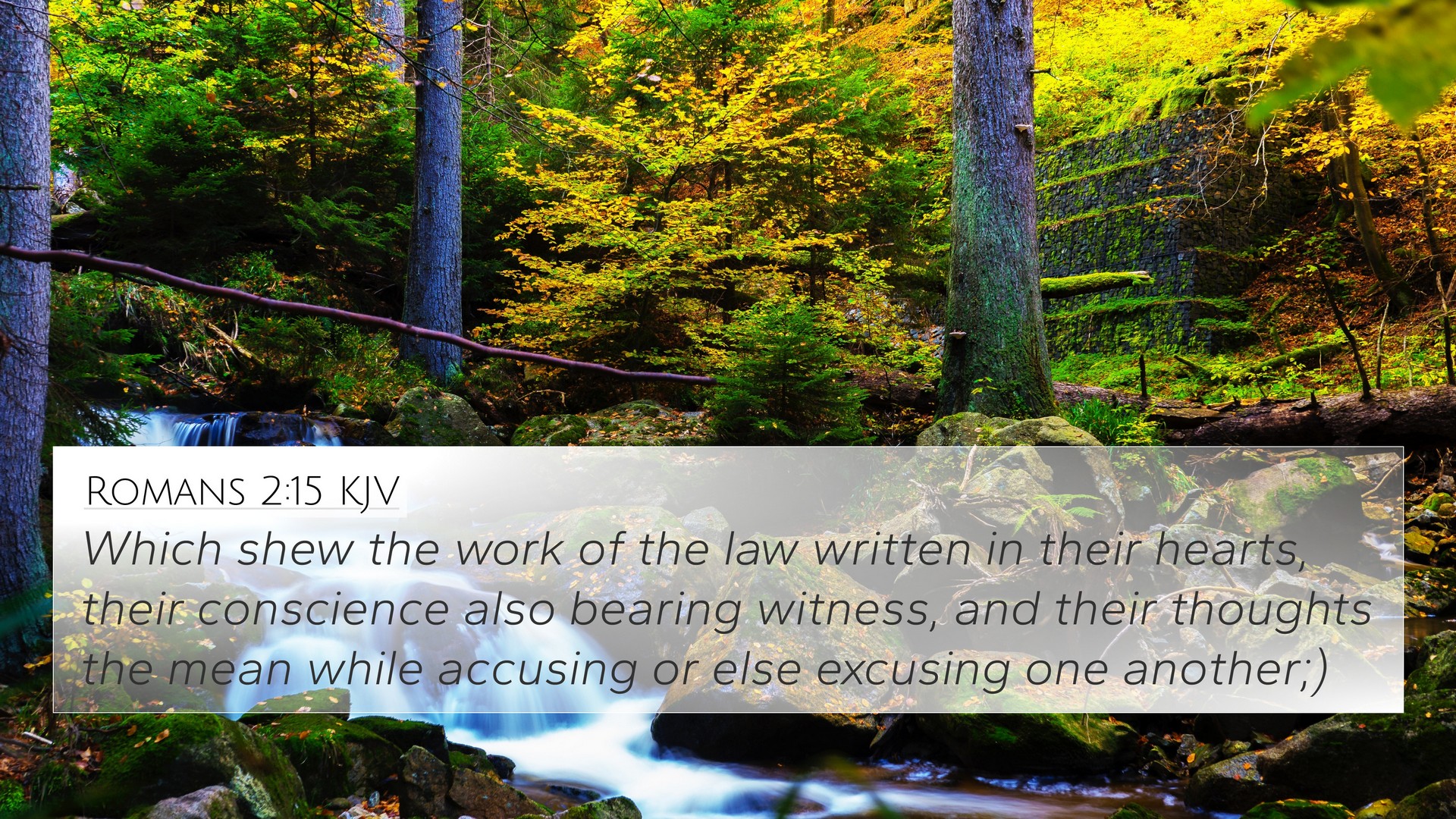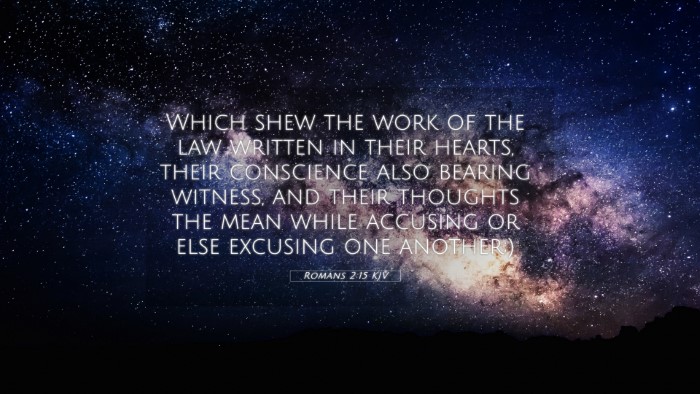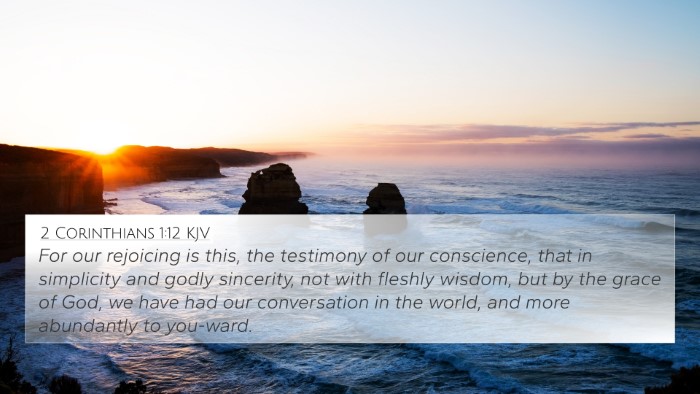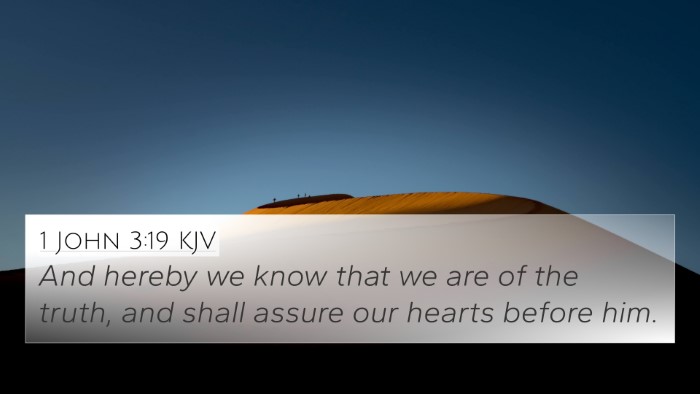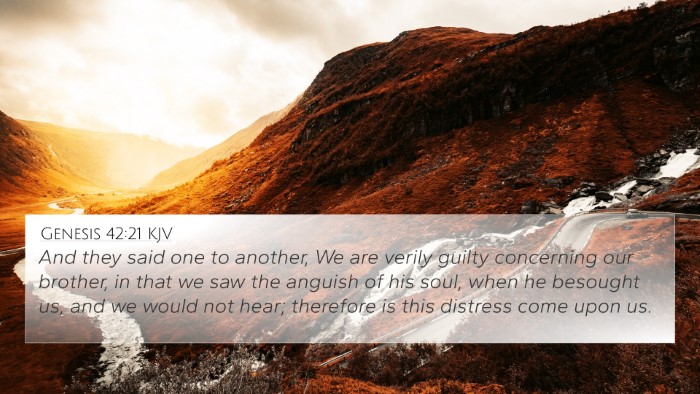Understanding Romans 2:15
Bible Verse: Romans 2:15 - "Which show the work of the law written in their hearts, their conscience also bearing witness, and their thoughts the mean while accusing or else excusing one another."
Summary of Meaning
This verse articulates the intrinsic knowledge of God's law that exists within human hearts, indicating that even those who do not have direct exposure to the written law possess an innate understanding of right and wrong. This inherent moral compass, or conscience, serves as a witness either accusing or defending one's actions.
Commentary Insights
- Matthew Henry:
Henry emphasizes that God has placed His moral law within every person, which asserts that humans are accountable for their actions. The conscience plays a critical role by bringing forth an internal realization of moral guilt or innocence. This divine imprint on the heart underlines the universality of the moral law, regardless of one’s background or exposure to religious texts.
- Albert Barnes:
Barnes notes that the “work of the law” signifies moral principles that guide human behavior and that conscience is a powerful internal mechanism that provides insights into one’s moral standing. He reflects on how this internal law operates amongst Gentiles, suggesting that it will play a pivotal role in God's judgment, indicating accountability based on their response to this moral knowledge.
- Adam Clarke:
Clarke posits that this verse reveals the existence of an internal moral sense in everyone, highlighting that it could lead them toward righteousness or condemnation. He asserts the significance of conscience in guiding decisions and the implications this has in the broader judgment context, linking it back to the idea of divine justice being meted fairly to all, irrespective of their knowledge of Scripture.
Connections to Other Bible Verses
Romans 2:15 has beneficial cross-references that deepen understanding:
- Romans 1:20: "For the invisible things of him from the creation of the world are clearly seen, being understood by the things that are made, even his eternal power and Godhead; so that they are without excuse."
- Jeremiah 31:33: "But this shall be the covenant that I will make with the house of Israel; After those days, saith the LORD, I will put my law in their inward parts, and write it in their hearts; and will be their God, and they shall be my people."
- Hebrews 10:16: "This is the covenant that I will make with them after those days, saith the Lord; I will put my laws into their hearts, and in their minds will I write them."
- 1 John 3:20: "For if our heart condemn us, God is greater than our heart, and knoweth all things."
- John 16:8: "And when he is come, he will reprove the world of sin, and of righteousness, and of judgment."
- Proverbs 20:27: "The spirit of man is the candle of the LORD, searching all the inward parts of the belly."
- Romans 14:10-12: "But why dost thou judge thy brother? Or why dost thou set at nought thy brother? For we shall all stand before the judgment seat of Christ."
Thematic Connections
The theme of moral conscience as presented in Romans 2:15 resonates throughout Scripture, exemplifying God's justice and mercy. This theme connects diverse Biblical texts and reinforces the idea that all humanity, regardless of their familiarity with the written law, has a shared consciousness of divine morality.
Cross-Referencing for Deeper Study
For a thorough understanding and comparative analysis of biblical themes, one may consider the following:
- Bible Concordance: A useful tool for finding specific passages that relate to Romans 2:15.
- Bible Cross-Reference Guide: Helps to navigate between related scriptures.
- Cross-Reference Bible Study: Engage in a deeper examination of interconnected verses.
- Bible Chain References: Connect themes from Romans 2:15 back to the Old Testament and New Testament.
Conclusion
Romans 2:15 serves as an essential verse in understanding human accountability and moral consciousness from a biblical perspective. The insights gathered from this scripture and its connections emphasize the beautiful tapestry woven through the entirety of the Biblical narrative that reveals the nature of God’s law and the human heart.
